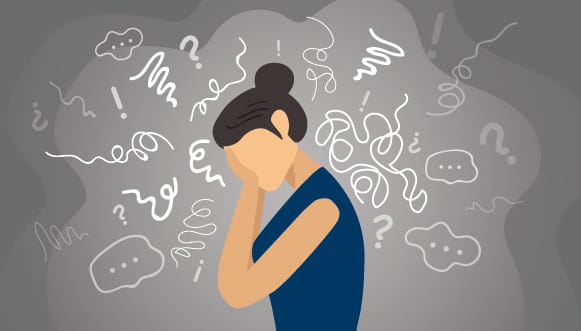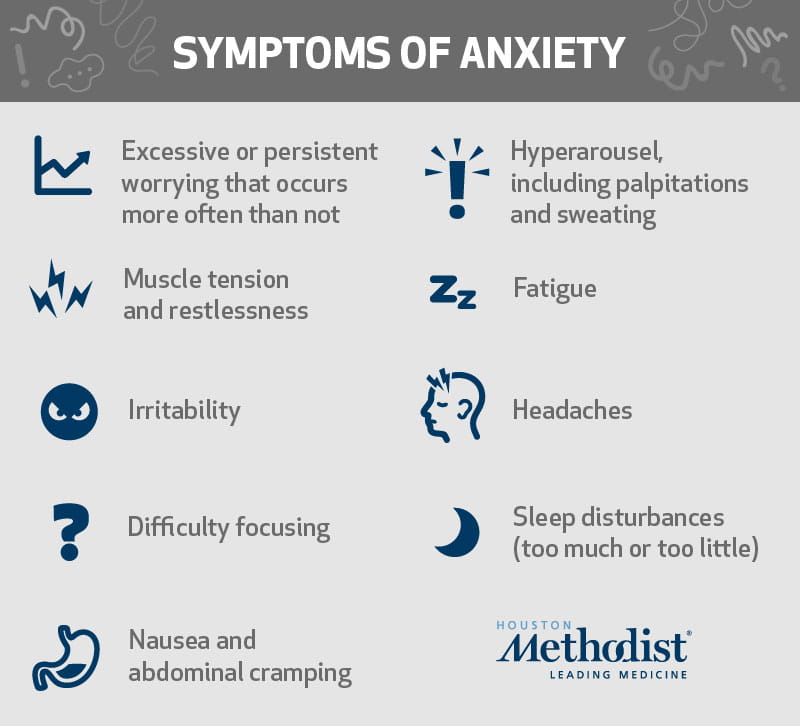What Anxiety Feels Like & Why It Happens
Feb. 14, 2022 - Katie McCallumGenerally speaking, we all have a lot going on in our lives: School, work, family, finances, health, relationships, friendships. And while your specific priorities may differ from someone else's — as well as shift over time — the one prevailing constant we all seem to be bound to is that there's almost always something to stress about or worry over.
"The various situations and events happening in your life greatly affect your overall mood. So when something is causing you to feel stressed or worried, it can impact your entire life — from personal to interpersonal to professional," says Dr. Ali Sawal, primary care practitioner at Houston Methodist.
And while anxiety may seem like some amorphous state-of-mind that you're either prone to experiencing or you're not, you may be surprised to find that anxiety is much more common than you think.
Are stress and anxiety the same thing?
When it comes to the variety of emotions we feel every day, we often use stress and anxiety interchangeably. But, the two are actually distinct.
"Stress is very common, and we all deal with it in our day-to-day lives. It's what we feel when a deadline is looming or in anticipation of an important event or occasion," explains Dr. Sawal.
While the feeling of being stressed may be unpleasant, there are some short-term benefits to it. Stress comes with physiological changes that can help you overcome challenges and meet your goals — such as increased concentration and enhanced reaction time.
"Anxiety, on the other hand, is when stress or worry become so excessive or so persistent that it negatively affects your daily life, as well as your ability to cope with the everyday stressors," says Dr. Sawal. "Similar to stress, anyone can experience anxiety. But, unlike stress, there are no advantages to anxiety."
In fact, Dr. Sawal adds that left unaddressed, anxiety can impact not only your everyday life but your overall health and well-being.
How does anxiety affect the body?
You know what stress feels like: Sweaty palms and the feeling of butterflies in your stomach are two of the most recognizable hallmarks of feeling stressed.
But, what exactly does anxiety feel like?
In the short term, you may be tempted to brush these signs and symptoms off. But, over time, you may begin to notice that the symptoms of anxiety affect your overall quality of life.
For instance, headaches and difficulty concentrating may make you less productive at work, muscle tension may lead to pain that keeps you from being active or getting a good night's rest, and nausea may affect your appetite and ultimately lead to fatigue.
"In addition, when anxiety is allowed to persist for some time, there can be long-term health implications," warns Dr. Sawal. "Generalized anxiety disorder has been linked to high blood pressure, poor cardiovascular health and coronary artery disease."
Will anxiety go away on its own?
"Anxiety and its symptoms resolve only when the underlying cause of the anxiety is addressed," says Dr. Sawal. "In some cases, a person may take control of the situation or circumstance causing their anxiety on their own — sometimes without even knowing it."
For instance, maybe anxiety stemming from out-of-control debt was alleviated by taking actionable steps towards reducing this debt and gaining better financial control.
"Other times, however, a person may struggle to either identify and/or address his or her anxiety. This is when talking to your doctor can help," adds Dr. Sawal.
Your doctor has many tools at his or her disposal to help diagnose and address anxiety. He or she can refer you to a behavioral therapy specialist, such as a therapist or psychologist, or prescribe medications that can help reduce your anxiety.
"Studies have shown both behavioral therapy and medications to be beneficial in addressing anxiety, and these studies also suggest that the two are even more powerful when combined together," explains Dr. Sawal. "Both aren't always needed lifelong — typically only for short periods of time when things are particularly chaotic or stressful for you."
What should you do when anxiety attacks?
While some symptoms build up and persist over time, symptoms of anxiety can also "attack" — often referred to as a panic attack.
"A panic attack comes with intense symptoms that can often be mistaken for symptoms of a heart attack," says Dr. Sawal. "Symptoms of a panic attack include a racing heartbeat, trembling or shaking, shortness of breath and chest pain."
If you know that what you're experiencing is a panic attack, Dr. Sawal recommends the following:
- Remove yourself from the source of your panic attack
- Engage in deep breathing exercises and positive self-talk
- Take steps to address why you are anxious to help prevent future panic attacks
But, if you're not sure that what you're experiencing is a panic attack and you're experiencing chest pain, it's critical that you talk to your doctor.
"Both anxiety and chest pain can be a sign of something more serious, and your doctor will need to confirm that your symptoms aren't caused by an underlying medical condition," adds Dr. Sawal.









